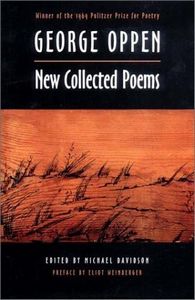George Oppen's New Collected Poems brings together all of the great Objectivist poet's published work, together with a selection of his previously unpublished poems. George Oppen's New Collected Poems gathers in one volume all of the poems published in books during his lifetime (1908-84), as well as previously uncollected poems and also a selection of his unpublished work. Oppen, who won a Pulitzer Prize in 1969, has long been acknowledged as one of America's foremost modernists. A member of the Objectivist group that flourished in the 1930s (which also included William Carlos Williams, Charles Reznikoff, Carl Rakosi, and Louis Zukofsky), he was hailed by Ezra Pound as "a serious craftsman, a sensibility which is not every man's sensibility and which has not been got out of any other man's book." Oppen's New Collected Poems (which replaces New Direction's earlier, smaller Collected Poems of 1975) is edited by Michael Davidson of the University of California at San Diego, who also writes an introduction to the poet's life and work and supplies generous notes that will give interested readers an understanding of the background of the individual books as well as references in the poems.
| LoC Classification |
PS3529.P54A17 2002 |
| Dewey |
811/.52 |
| Nationality |
American |
| Pub Place |
New York |
| Dust Jacket |
dj |
| Cover Price |
$37.95 |
| No. of Pages |
320 |
| Height x Width |
9.3
x
6.3
inch |
| First Edition |
Yes |
|
|
|
|
Faced with the effects of the depression and the rise of fascism, the Oppens were becoming increasingly involved in political action. Unable to bring himself to write verse propaganda, Oppen abandoned poetry and joined the Communist Party serving as election campaign manager for Brooklyn in 1936 and helping organize the Utica New York Milk Strike. He and Mary were also active for relief and Oppen was tried and acquitted on a charge of felonious assault on the police.
By 1943, Oppen was deferred from military service while working in the defense industry. Disillusioned by the CPUSA and wanting to assist in the fight against fascism, Oppen quit his job, making himself eligible for the draft. Effectively volunteering for duty, Oppen was called up in 1943 and saw active service on the Maginot Line and the Ardennes; he was seriously wounded south of the Battle of the Bulge. Shortly before the end of his tour of duty, Oppen helped liberate the concentration camp at Landsberg am Lech. He was awarded the Purple Heart and returned to New York in 1945.
was badly wounder in the war
Weil changed her opinion about the use of force in no way diminishes her definition of force as something that bends every soldier (living or dead) to its will, reducing him or her to a thing. George Oppen proposes a similar definition of force in "Blood From the Stone," a reflection on his combat experiences as an infantryman in the US Army's 103rd Division during World War II:
Oppen from Oppenheimer
